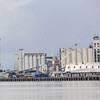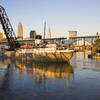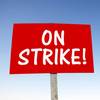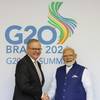The Port of Los Angeles is making $6m available for projects that reduce air pollution generated by Port operations. The funding is a component of the 2006-2007 Port Air Quality Mitigation Incentive Program. An applicant workshop and vendor fair will be held on August 29 at 10 a.m. Deadline for submissions is October 24, 2006.
The Port Air Quality Mitigation Incentive Program provides financial incentives for programs that will reduce air emissions that affect neighboring communities of Wilmington and San Pedro, as well as the surrounding areas. Proposals will be reviewed by Port staff and members of the Port Community Advisory Committee, judged on effectiveness and emissions reductions, and ultimately approved and awarded funding by the Los Angeles Harbor Commission.
Funding for these selected pollution reduction initiatives comes from the Port’s Air Quality Mitigation Incentive Program, created as part of a lawsuit settlement in 2003. The total amount of air quality measures that will be funded over five years is $21m. A balance of $14 million remains in the fund, inclusive of the latest $6m made available.
In the last round of incentive projects, more than 30 proposals were submitted by Port customers, with 16 selected and more than $3 million in funding awarded. Projects funded have included: Catalina Express – engine repowering on four main and two auxiliary engines of one ferry boat; Marine Terminals, Corp. – use of low-sulphur fuel with purifying muffler on 17 rubber-tired gantry cranes; Yusen Terminals, Inc. – installation of Diesel Particulate Filters continuous regeneration trap with selected catalytic reduction; and Pick Your Part Auto Wrecking – engine repowering on four scrap loaders.
$6 Million in Air Quality Projects
Project proposals for this round may include: engine repowering, engine retrofitting; after-market technologies; and new engine purchases. Program categories include: Stationary Source; On-Road Heavy-Duty Vehicles; Off-Road Heavy Duty Equipment and Engines; Alternative Fuel Infrastructure; Alternative Diesel Fuel Strategies; and Research, Demonstration and Development.
Featured videos

Inmarsat Enhances Service to Drive Digitalization

Inside the Electrified Truckable Tug

Tracking Foreign Vessels Working in the U.S. Jones Act Market
Subscribe for
Maritime Reporter E-News
Maritime Reporter E-News is the maritime industry's largest circulation and most authoritative ENews Service, delivered to your Email five times per week









